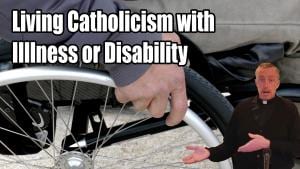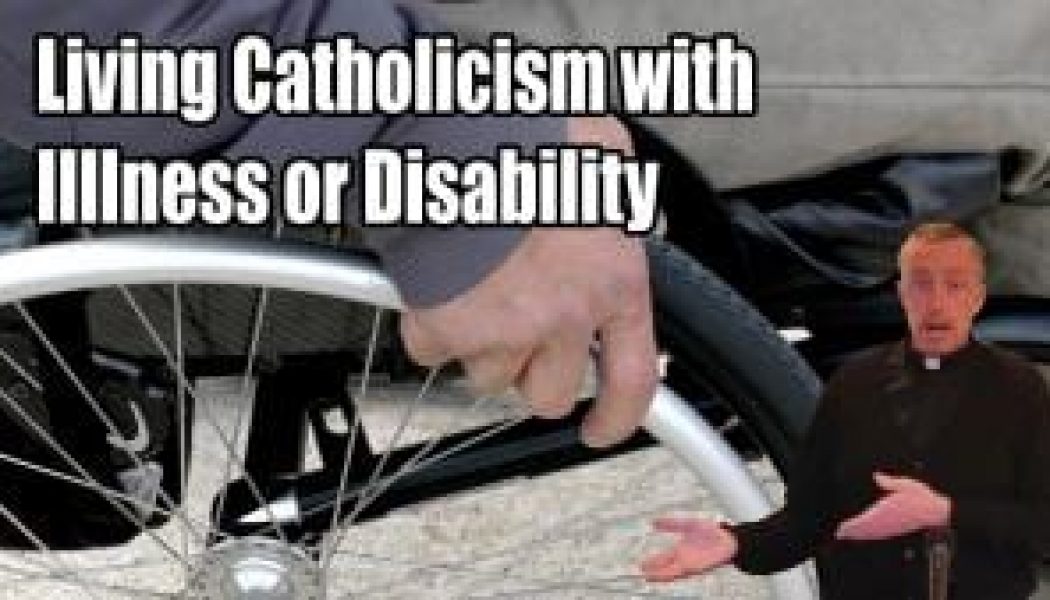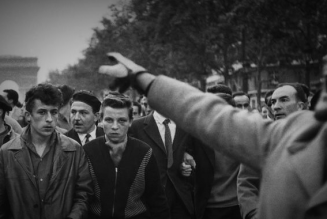This summer I gave a talk on “Living Catholicism with Illness or Disability” for an online conference. Now that the conference is completely dark and nobody can see the talk I gave, I figured it worthwhile to upload the talk again, but to my own channel. I hope you enjoy it. Here’s the video and I have my notes below. (The notes are close to a transcript as they are what I used, but I’m sure I adlibbed a few things, not in the notes.)
[embedded content]
My Notes for This Talk
When I was in school, there was this girl in my class. She came to class with her hair undone, with dirty clothes and smelling bad. She seemed to carry all that mattered to her in her fanny pack. Then she was gone from school in second or third grade. We all teased her behind her back, we avoided her and were mean to her. As a kid, I just didn’t understand how a mom would let a kid come to school like that. I could understand how a kid could do that: I mean half of my elementary school photos have me with a buzz cut as mom couldn’t stand my messy hair.
In hindsight as an adult, I realized she was most likely abused and when she left, she was probably put in foster care. I could have picked up something even before I got child protection training, but 7-year-old me was clueless. I think most adults can clue into signs like that and have compassion on the poor child.
After I was diagnosed with depression and autism, I realized another level we sometimes fail in giving compassion. I realized that even I had looked down on those with psychological conditions beforehand. I never consciously discriminated, but I could see a few times I mistreated people with disabilities in small ways like ignoring them or not seeing their value.
In this talk, I want to speak about how we as Catholics can deal with illness or disabilities. I will first speak about three stages for the whole church, then about some pointers for the sick or disabled.
Disability and the Whole Church
The whole Church needs to welcome those with disabilities. I see three stages of how this is done. I usually see step one done, sometimes step two and rarely step three.
The first stage is to avoid outright discrimination. If I go back through the archives, I can see stories where no church in town had a wheelchair or a parish got a restraining order against an autistic young man. There are still occasional stories like this but many end up being more an issue of communication. For example, there was a case in New Jersey back just before lockdown where looking at it closer seemed to be a miscommunication issue that the parents took to the media, not direct discrimination. Most parishes have accessible entrances now and I don’t see parish staff or volunteers using the R-word about those with intellectual delay.
The second stage is acceptance. This is where we get the hearing aid loop for a parish so the hard of hearing can hear Mass or the diocese organizes a deaf Mass each week. For us autistics this often means making a reverse cry room where the light and sound is lower or a special low sensitivity Mass regularly. We look for ways to help kids with learning disabilities participate in CCD. We might offer a depression or addiction support group.
The third stage is inclusion, which is so often forgotten. In the prior level, the disabled were seen as objects of but ministry. However, if we want them fully engaged, they need to also become subjects of ministry: the ones who minister. This is far less common. Occasionally, I will see a person in a wheelchair in the choir or a person with a developmental delay helping with distributing food to the homeless. However, how often do we as a Church not even consider people with disabilities in this regard.
The ultimate goal of everyone in Church is to love God and our neighbor. What is love? Love is willing he good of the other. If anyone wants the best for anyone, it is to get them also to love – this means helping them to become ministers. Obviously, we need to look for ministries that match someone’s interests and talents as not every disability matches every ministry. For example, me as an autistic, would not do well in a ministry where you need a social butterfly.
Disability and the Individual
Different illnesses or disabilities present different challenges to a Catholic. However, I think there are four attitudes that are common to almost any disability or illness.
1st Attitude: Acceptance
Often, we have a certain vision of holiness. We focus on praying a lot, serving others, etc. All of this is good. But where a problem comes in is when we have an illness or disability that prevents us from doing this as much as we hope and we think this is an obstacle to holiness. Instead, holiness is our mind and heart directed fully to God. If today you have a migraine so can’t serve anyone and can’t focus long enough to complete a rosary, that doesn’t make you unholy. God wants you to be holy through this illness or disability, not in spite of it.
Sure, we aren’t always perfect. I’ll be honest here, I had this talk half-written when I came down with what was most likely bacterial pneumonia and was in bed for 4 days with a fever. I felt miserable and I even missed the suggested date Fr Leo wanted this video in so his team could add the final touches. I mean, preaching like this is part of a priest’s ministry, an act that helps us be holy. But at that moment, Jesus wanted me to be holy lying in bed taking care of myself, not preparing this talk. That was his holiness for me then.
In fact, we can read in Romans 8:26-28:
The Spirit helps us in our weakness; for we do not know how to pray as we ought, but the Spirit himself intercedes for us with sighs too deep for words. And he who searches the hearts of men knows what is the mind of the Spirit, because the Spirit intercedes for the saints according to the will of God. We know that in everything God works for good with those who love him, who are called according to his purpose.
God has a purpose for us in our illness or our disability. Even if we may have difficulty seeing it at times.
2nd Attitude: Come as You Are
In most other religions, God asks you to be perfect before you come to him. But not Jesus. In fact, let’s read John 7:37-38:
On the last day of the feast, the great day, Jesus stood up and proclaimed, “If any one thirst, let him come to me and drink. He who believes in me, as the scripture has said, ‘Out of his heart shall flow rivers of living water.’”
Jesus says come to me when you are thirsty. He doesn’t say find thirst for your soul then come to me.
So often, we feel that without overcoming our disability or illness we can’t come to Jesus, we can’t come to Church. In fact, this seems a common experience as Bethany McKinney Fox notes in Disability and the Way of Jesus (92):
A number of interpreters in the disability community note that bodily conformity seems to be the price of admission to the Christian community. This is decidedly unliberating for those who have come to see the locations of the problem in inaccessible cultural systems and not in their bodies.
However, that is bad theology. Jesus has specifically told us to come when thirsty to come, he calls the children to him, he draws the sick to him. We should never feel like an illness or disability keeps us from Jesus. It is very clear, he doesn’t reject us due to it.
3rd Attitude: Realism
I think one challenge, especially with things that make us physically or psychologically tired, is setting and holding ourselves to unrealistic goals. Some conditions like OCD or Autism can tend to make this worse by the nature of their condition.
But what does Jesus say? Let’s look at Matthew 11:28-30
“Come to me, all who labor and are heavy laden, and I will give you rest. Take my yoke upon you, and learn from me; for I am gentle and lowly in heart, and you will find rest for your souls. For my yoke is easy, and my burden is light.”
If Jesus’ yoke is easy, he’s not going to be sitting there expecting something that is impossible or almost so. Sure, that other person prays X, Y, Z, A, B & C, every day. But that doesn’t mean God is calling you to do the same. God is calling you to spiritual practices you can maintain.
Depending on what your disability or illness is, this might vary a lot. We need to remember that Jesus asks every Christian to come to Sunday Mass if they can and pray every day. Neither he nor the Church gives specific rules that must be followed regarding what prayers should be said each day. When one of us decides what prayers we’re going to do daily or what exceptions we give ourselves we need to be realistic. Some exceptions are really obvious like you can’t hold yourself to going to mass if you have a fever of 101. But some are less obvious, as for example often when you have a fever you only have limited concentration so you might split your daily rosary into two.
4th Attitude: Offer It Up
Finally, almost any illness or disability comes with some struggles, some suffering, whether it is directly pain, physical discomfort or just psychological, it is an added struggle that others don’t have. We can simply commiserate about it or we can join ourselves with Jesus on the cross and make that suffering redemptive. St. Paul explains his own experience of this in two passages. In 2 Corinthians 12:7, he notes:
To keep me from being too elated by the abundance of revelations, a thorn was given me in the flesh.
This thorn in the flesh does not go to waste. In fact, in Colossians 1:24 he describes how feels about this thorn.
Now I rejoice in my sufferings for your sake, and in my flesh, I complete what is lacking in Christ’s afflictions for the sake of his body, that is, the church.
St. Paul obviously did commiserate. He united himself with Jesus and offered his sufferings with him in the passion. Sometimes, we might think that our particular suffering didn’t match Jesus’ suffering but in the Passion, Jesus suffered every human form of suffering. He suffered social isolation, he suffered psychologically, he suffered being unable to do things. As an autistic, often my sufferings are more psychological and I meditate more often on the Agony in the Garden where Jesus takes upon himself the sins of the world as at that moment you see his psychological suffering most dramatically.
Conclusion
In conclusion, there is no magic bullet. We as a Church and as individuals need to strive so that those with such difficulties can be part of the Church and fully live their – or our – Christian vocation. In this talk, I covered the three stages from not outright rejecting us to full inclusion. I also covered four attitudes we should all have when dealing with an illness or disability: acceptance, come as you are, realism and offer it up. I hope that this helps with current or future struggles you have. Jesus wants every person to come to him and be saved.
I want to mention before ending that if you want, I will have a book coming out in a year or so from Pauline Press on prayer for autistics. The tentative title is God Looks on the Autistic Mind with Love: 52 Devotions for Autistics, Aspies and Those who Love Us.
Note: I hope this is helpful to you. If you liked it, please support me via Patreon.










